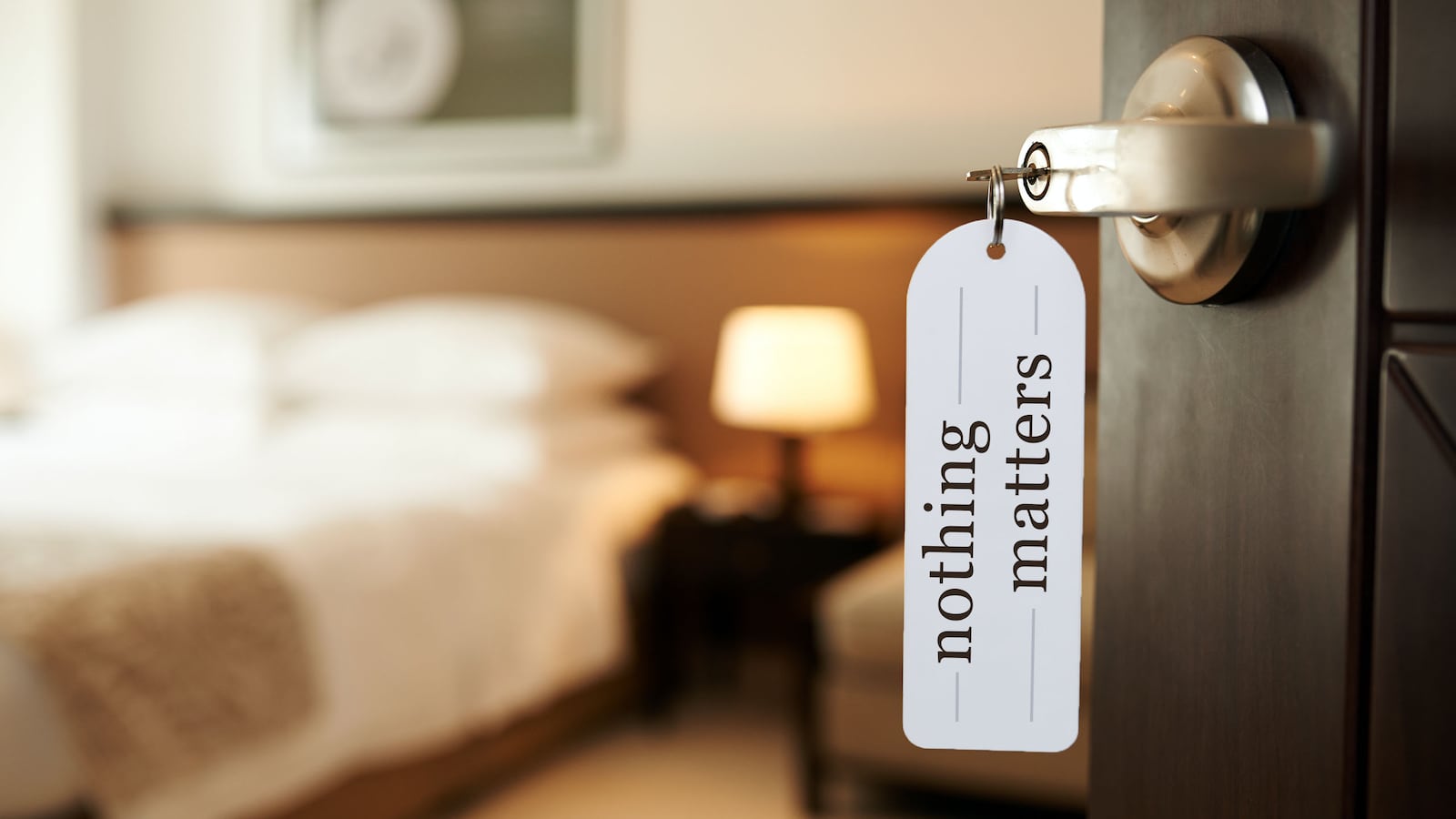It usually goes something like this: The hotel room door shuts behind me with a thud. I let my suitcase drop to the floor. I kick off my shoes and collapse onto the bed. I try to push thoughts about whether the duvet has been washed from my mind. There’s a low hum, coming from either the mini-bar fridge or the air-conditioning. It’s too quiet.
I turn on the TV. It’s the news. I’m reminded of all the reasons to panic, including but not limited to Donald Trump, climate change, nuclear weapons and plastic-clogged oceans.
I remember the TV remote is the most germ-ridden object in a hotel room (according to studies people like me take notice of). I fling it onto the bed. I go to the bathroom to wash my hands. I fixate on a single hair in the shower that housekeeping missed.
I decide to go out. I realize I don’t know what’s good around here. I grab my phone and Google “best restaurants in [insert unfamiliar current location]”. I scroll articles and Yelp reviews. I get overwhelmed by choice and decide to order room service instead. I inspect the menu. I feel resentful at paying $36 for a cheeseburger. I feel grossed out at the thought of eating said $36 cheeseburger in the room where I’ll sleep. Then I realise it doesn’t matter. Because we’re all going to die one day.
The sensation hits me like a tidal wave: an overwhelming sense of existential dread. A feeling that something is deeply wrong, or missing, but I don’t know what it is. Like I’ve had a fatal amount of coffee. Like a comfortable illusion has been stripped away.
I’m aware this sounds suspiciously like a privileged problem. But it can happen whether I’m in an inner-city boutique hotel with luxury bath products and local art on the walls, or a roadside Days Inn. Whether I’m traveling for work or for a vacation, whether I’m with someone or alone.
Jet lag, loneliness, a suspect stain on the duvet or bland decor could all be to blame, but I knew there was more to it. So I asked Sarah Wilson, author of New York Times Best Seller First, We Make The Beast Beautiful: A New Journey Through Anxiety.
“Most of us do not have opportunities to ‘sit with ourselves’ very often,” Wilson said.
“In a hotel, we often find ourselves with spare space and time to do this. This can be confronting, particularly for A-type business people and ambitious travelers, for whom running from oneself, and grasping outwards to ‘fixes’ and activity, is a coping mechanism.
“The stillness of a hotel room between meetings or with only the company of your room service tray forces us to confront ourselves.”
At home, a never-ending list of chores, a towering pile of to-be-read books on the nightstand and an always almost full DVR keep us busy and entertained. Distracted from our inevitable mortality. As a hotel guest, the things we often use to define ourselves—the country/state/city/town we live in, our home, our family and friends, our pets, our jobs—are no longer immediate. When these things are sucked away like water draining out of a bathtub, we’re left exposed, uncomfortable, vulnerable.
Hotels know this. In an effort to comfort their angsty guests, some have introduced, just to name a few, in-room meditation apps, emotional support animals, horse therapy, healers, hypnotherapists and life coaches on speed-dial, yoga mats, calming massages, acupuncture, anti-insomnia weighted blankets, and aromatherapy oils. La Palomilla, a boutique hotel in Mexico City, recently began placing worry dolls—a Mexican and Guatemalan tradition for coping with sadness or stress—on the bedside table.
Such things are thoughtful touches that might ease our restless, fretful souls briefly, but they are only quick fixes, says Jennifer Shannon, Cognitive Behavioral Therapist and author of Don’t Feed The Monkey Mind.
“Travel fatigue, being alone, jet lag, hygiene or safety concerns, a sterile environment, fearing you won’t be able to sleep well, worrying about family or pets at home—all of this can contribute to anxiety in hotel rooms,” she explained.
“You may come to associate a hotel room with past experiences of not being able to sleep, thus causing anxiety which then, of course, causes insomnia.”
Shannon uses exposure therapy with patients to overcome hotel room anxiety.
“I am working with a client who has a fear of staying in hotels after he had a panic attack in a hotel room 10 years ago while traveling for business,” Shannon said.
“I expose him to panic sensations in my office by having him briefly hyperventilate. I then teach the patient how to relax into the sensation and the anxiety itself.
“The most common mistake people make is thinking they need to get rid of their discomfort,” Shannon explained.
“The immediate goal is not to get rid of the anxiety, but to relax into it, teaching our ‘monkey mind’—that is the amygdala, the less evolved part of the human brain that is concerned with our safety and survival—that this is a false alarm.
“It is much better to ride the discomfort out, which helps to teach us we can handle it.
“When we gain this confidence, the discomfort diminishes. It is the old adage, ‘what we resist persists’. So much of what I teach my clients is that when we learn to welcome, rather than resist discomfort, our world opens up, we gain confidence and anxiety decreases.”
Wilson has a similar perspective when it comes to anxiety. In First, We Make The Beast Beautiful, she argues anxiety is not a condition that needs to be obliterated with medication but a teacher, a yearning to tune into to lead us to deeper meaning.
As someone descended from a long line of worriers, I find the reframing “anxiety and existential curiously are connected,” as Wilson writes, comforting.
This, the author says, has “helped [her] understand [her] restlessness ever since”.
Still, Wilson has developed her own strategies for putting herself at ease in a hotel.
“I will always ensure I walk before bed, often to go get a meal. If I arrive at night, I’ll still walk for an hour or two. Walking has been shown to shut down the anxious part of the brain. I think it’s also important to keep your ‘bedroom’ just for sleeping. I don’t get room service for this reason—a sleep hygiene issue. I also try to work to a routine similar to back home—I exercise and then meditate in the mornings.”
A wiser choice than drinking an irritatingly small and overpriced bottle of chardonnay from the mini-bar in bed while watching back-to-back episodes of Dateline. Noted.





